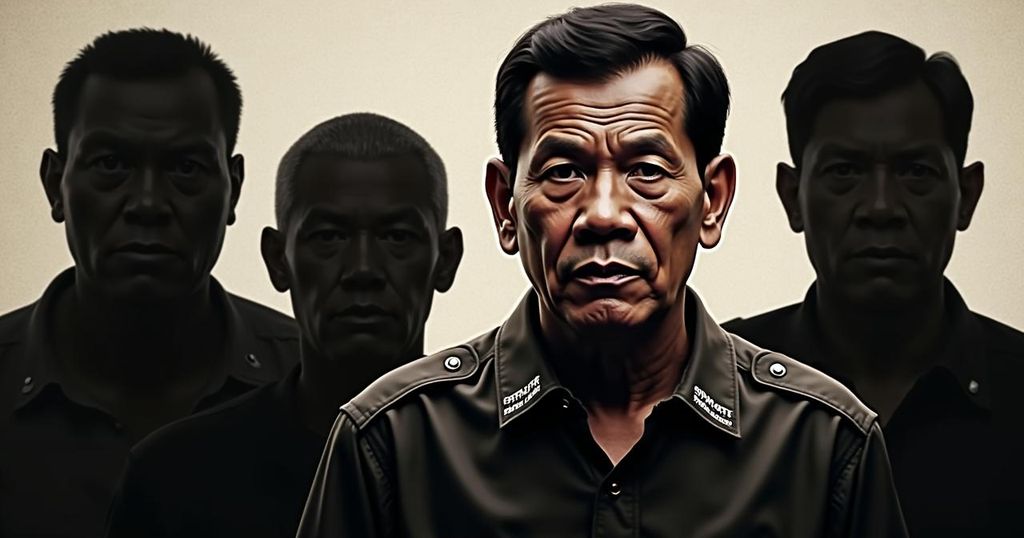Philippines Intensifies Pursuit of Duterte-Linked Fugitives as Political Alliances Shift

In September 2024, the Philippine government launched a targeted operation resulting in the arrests of six fugitive suspects connected to former President Rodrigo Duterte, amidst a political shift following the collapse of the Marcos-Duterte alliance. The operations, perceived as a strategic move by President Ferdinand Marcos Jr. to assert authority and accountability, have drawn both commendation and criticism regarding the enforcement of justice and prior lapses in security.
In September 2024, the Philippine government intensified its efforts to apprehend fugitives previously connected to former President Rodrigo Duterte, as political tides shifted following the dissolution of the alliance between President Ferdinand Marcos Jr. and the Duterte family. Over the course of three weeks, law enforcement officials successfully captured six significant targets, a notable achievement that experts believe was facilitated by the decline of ties between the Marcos administration and the Dutertes. Among the apprehended was former mayor Alice Guo, accused of espionage and connections to a criminal syndicate involved in illicit online gambling operations. Guo was arrested by Indonesian authorities after fleeing the Philippines and subsequently deported. Other notable arrests included Apollo Quiboloy, a controversial preacher and close associate of Duterte, who faces multiple serious charges, as well as Lloyd Christopher Lao, implicated in irregularities concerning pandemic procurement. The government also detained Tony Yang, linked to the criminal activities surrounding Guo, and additional suspects in various criminal cases. Political analysts have suggested that these arrests represent President Marcos’s strategic maneuver to distance himself from the previous administration and to establish a stronger law enforcement image. “I look at it as Marcos being on the offensive against the Dutertes,” remarked Dr. Carmel Abao of Ateneo de Manila University. Furthermore, experts noted that the apparent impunity previously enjoyed by the Dutertes has waned, influenced by declining public support and diminished political capital. Although the Marcos administration has been criticized for initial lapses in security and intelligence, notably regarding Guo’s prior escape, there have been assurances that protocols for apprehending fugitives will be reevaluated. The Marcos government is also under pressure to see the cases against these individuals proceed to a meaningful conclusion in the judicial system. As the month concluded, these developments highlighted a pivotal shift in Philippine politics, emphasizing the increasing accountability expected of government officials and former associates of the previous administration. The actions taken in September signal a commitment by the Marcos government to uphold the rule of law and to confront the challenges posed by high-profile fugitives within the context of its evolving political landscape.
The context of the article reflects significant political changes in the Philippines following the end of Rodrigo Duterte’s presidency and the challenges faced by incumbent President Ferdinand Marcos Jr. Analysts observe that the dissolution of the alliance between the Marcos administration and the Duterte family has emboldened law enforcement to pursue former Duterte allies who were previously untouchable. This political shift appears to mark a departure from the culture of impunity that characterized the Duterte administration, suggesting a complex interplay of power, political relationships, and governance in the country.
The recent crackdown on fugitive suspects associated with the former administration illustrates a crucial turning point in the Philippine political landscape. The operations carried out by law enforcement are indicative of a strategic shift towards accountability and transparency under President Marcos, as the government seeks to break from the prior political alliance and restore public trust. Moving forward, the administration faces the challenge of ensuring that these legal proceedings are thoroughly pursued while also addressing systemic issues that have historically allowed corruption and illegal activities to persist.
Original Source: asianews.network







